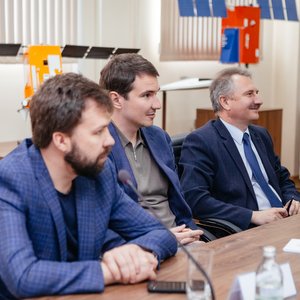On May 20, Samara University was visited by
Denis Sekirinsky, Deputy Minister of Science and Higher Education of the Russian Federation,
Aleksandr Abrashkin, Deputy Director of the Russian Centre for Scientific Information, and
Anton Shashkin, Secretary of the Expert Council of the Carbon Polygons project.
The visit took place in framework of the seminar-meeting of world-class scientific and educational centres, which was held in Samara.
The purpose of the working visit was to get acquainted with the scientific and educational infrastructure of the University, and discuss significant projects in the fields, such as aerospace, propulsion engineering, additive technologies and UAVs.
The guests visited the small spacecrafts ground control complex to have been operating at Samara University since 2015, and got acquainted with features of small spacecraft of the AIST line, as well as research and applied tasks to be performed with their help.
Director of the Advanced Aerospace Engineering School of Samara University Ivan Tkachenko told about the University plans to create a small radar surveillance spacecraft “AIST-ST.”
“Together with our partner STC (Special Technological Centre) LLC (Saint Petersburg), we work at the device on the base of twelve-unit cubesat with radar equipment. The launch is scheduled for 2024. Design work is currently underway, and it is this device that we are going to work out serial production technologies on. The Advanced Aerospace Engineering School is engaged in adapting the device design to robotic serial assembly. The enterprise has ambitious plans to create the grouping of 600 such devices, we hope that our mass production technologies will be useful here,” Ivan Tkachenko said.
Besides, special attention was paid to organization of serial production of unmanned aerial vehicles (UAVs). The University is one of the centres for developing competences in this field; the first in Russia educational programs for UAV operators were organized here in 2019. In addition to educational activities, the Centre for Unmanned Systems of Samara University takes part in interdisciplinary research projects and is engaged in production activities. On the base of the Centre, serial production of drones has been organized, with about 1,000 unmanned aerial vehicles in total to have been assembled by the end of the year.
“Currently, we assemble the devices using partially imported components and our own payload (chromatographs, hyperspectrometers), but there is a request for producing on the base of the University UAV components — carbon frames, engines, etc. Much attention is currently paid to our Centre by industrial partners who are interested in organizing serial production of a number of the components for manufacturing small-sized UAVs,” commented David Ovakimyan, Head of the Centre for Unmanned Systems of Samara University.
Another point of the visit was the Laboratory of Additive Technologies. Director of the Institute of Engine and Power Plant Engineering of Samara University Vitaly Smelov told about performance of works in the interests of industrial enterprises and introduction of import-substituting technologies.
Since 2014, Samara University has been a leading competence centre in the field of designing and testing additive technologies for manufacturing functional products of various industries. Over the time, the following technologies have been developed and tested: technologies of making complex-profile parts of domestic materials for leading enterprises of the Samara Region.
The Laboratory is furnished with specialized additive manufacturing installations of selective laser melting and direct laser growing. On the base of the University, they help produce of domestic metal-powder compositions parts with improved functional specifications and highly reinforced properties.
Vitaly Smelov told about the project to create a low-power gas turbine plant for needs of on-site generation. Such power plants can be used at power supply facilities of small settlements, microdistricts, industrial enterprises, shopping centres, hotels, hospitals, etc. Currently, in this segment of energy in our country, as a rule, microturbine on-site generation of foreign production, mainly by Capstone (USA), is used. The Samara University scientists’ development will help solve the issue of import substitution in Russia of the American Capstone C65 installation.
“We undertake to start testing this installation by the end of this year, to prepare all the necessary design documentation. The project is implemented jointly with the world-class REC “Engineering of the Future” as part of the experiment on expert support of FIPS (Federal Institute of Industrial Property project office),” commented Vitaly Smelov.
In course of the visit, the meeting dedicated to implementation of research projects was held. Deputy Director for Science of the Propulsion Engineering Design Bureau Grigory Popov presented the project “Digital Twin Engines”; Director of the Artificial Intelligence Institute Artem Nikonorov presented the University’s “greenfield” in the area of artificial intelligence; Head of the Department of Ecology and Life Safety Vladimir Platonov told about research in framework of the project on creation the agricultural carbon landfill.
The guests also visited the Aviation Engines History Centre, the Military Training Centre and new educational spaces of the Advanced Aerospace Engineering School - interactive complexes for advanced training of engineering personnel based on modern VR technologies, robotics and additive technologies. The main frontier task of the School is transition from manufacturing a single high-tech product to its serial mass production. “It’s about serial production of engines, small-sized GTE, small spacecrafts, drones and small regional aviation aircrafts based on the concept “Digital Plant”, which underlies the scientific-educational activity of the Advanced Aerospace Engineering School,” said Ivan Tkachenko, Director of the School.
